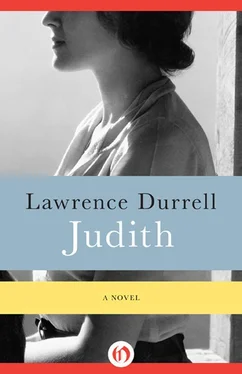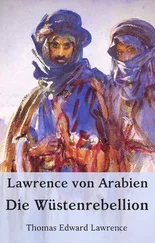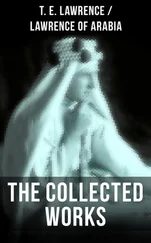Isaac beckoned him close and lowered his voice, aware how far sound carries on water. “There are people in two of the crates.”
Nadeb expelled a puff of air with relief — so the skipper had not gone mad after all. Then he too began to look concerned. “People — in there ?” He felt a sudden surge of indignation. It was as if a trick in bad taste had been played on them. Why had they not been warned? The little party on the rocky road stared at the “Zion” as she fumed along. “Wave, you fool,” said Isaac, as with his free hand he waved a hallucinated farewell.
The first headland was on them, and now the ship turned sharply east and headed for land again, running in the shelter of the tall cliffs; a convenient cliff lay ahead. Nadeb leaped forward like a cat and muttered to the somewhat listless bearers of axes and crowbars. The news galvanized them. They moved in a cluster to examine the crates in question, carefully noting their perforated sides and the slant of the battens which held them together. They waited in sickened apprehension until the “Zion” switched off and wallowed in the still waters of the little creek and Isaac waved them urgently into action. Then they fell to work like maniacs with the backs of their axes, tackling the yellow crates. Isaac himself ran forward to lend a hand.
Had there been a watcher on the cliffs, he would certainly have concluded that the little group of men had gone mad. They banged and crashed at the wooden crates, tearing and pulling away at them with hammers, crowbars, even their hands, as if their very lives depended on it.
In the brilliant light of the westering sun, the smooth sea gleamed and glittered like a jewel, dark when it was shadowed by the shouldering cliffs. The scene itself was certainly an incongruous one: these men flailing away at the crates, tearing off long strips with their hands and tossing them overboard. The wood floated silently beside the boat in the water, with an air of astonishment, its stencilled markings clear for all to see. They ate into the first crate like gourmets into a cheese, forcing the battens apart, squeezing and pushing. It disgorged a mountain of filthy straw such as might line a stable floor, stinking with excrement, but not a word, not a noise of a human being. They called hoarsely, but no answering voice greeted them. They had virtually dismembered the box now. They threw down their implements and plunged into the muddle to recuperate the human beings they had been told existed beneath all this elaborate packing. At long last they managed to extract the first two occupants, whose bodies lay coiled in that nest of dirty straw like maggots in a cheese. Quickly, tenderly, they were laid upon deck in the brilliant soft sunshine and Isaac clawed at their tattered rags in order to lay his shaggy ear upon their hearts. Behind him he could hear the booming and crashing as the second crate was attacked. “They are both dead,” he said at last, sadly, still crouched on one knee, his wily old face wrinkled a thousand ways.
The older man had a beard of patriarchal cut and snowy whiteness and immensely long, dirty fingernails. The youth could not have been more than fifteen. The smashed and buckled fibre suitcase had a few dirty clothes lolling from it. Both bodies wore small metal identification discs on the forearm, though whether of Nazi provenance or not he could not tell. Isaac puffed grimly at his pipe as he consulted them. “Father and son,” he said under his breath, sitting back on his haunches and looking at them. “Father and son.” Behind him surged the racket of the axes busy upon the second crate. They had been lying as if asleep, entangled in a travesty of sleep, their arms round one another; now, in the relaxation of death, their attitude suggested a helpless and yet somehow triumphant surrender. Sincerely moved, Isaac got up, shaking himself like a dog, and waddled aft for a drink of water. Then he took up an axe and joined his crew in their assault on the second crate which they had already half demolished.
Judith heard them coming, but as if from a very long way off. The crate itself echoed like a gigantic sounding-board to the boom of their implements, so that she imagined something like the distant stampede of a horde of elephants whose foot-falls shook the world. Each axe-blow seemed to land in the centre of her brain, deafening, beheading her. Her mouth she kept pressed to a perforation in the wood which enabled her to drink in air with long, laboured inspirations. Somewhere in the straw beneath her she could hear the voice of the religious fanatic muttering away — like the sound of a bumble-bee trapped in a spider’s web, now faint and distant, now gathering strength again. Outside the confines of this blind world the racket was infernal. But now, gradually, extraordinary strips of blinding sunlight and blue sky appeared, tearing at her eyeballs. It was as if she were an entombed queen hearing the picks and shovels of the archaeologists approaching her. Voices called and she tried to answer, but her lips and throat had swollen — or so it seemed. The hot and rank odour of straw scorched her lungs. A groping hand touched her shoulder and she shrank away with pain, for her body was a mass of bruises. The daylight was pain, the pain blindness; she shrank from her rescuers.
Then with a splintering bang the walls of this stuffy universe gave way and drew back; sweet air rushed in. The blue sky pierced her like a spear. She shut her eyes fast against it and felt herself scooped up and carried, to be laid down somewhere on a hard deck among voices, the lapping of water, and the smell of hot machinery. No, it was beyond belief, she must be dead! But a rough calloused hand raised her head, a hairy face brushed her body and a voice said soberly: “Well, this one’s alive all right.” Alive! The voice itself sounded so incongruous that she wanted to laugh, but in her weakness all she could manage was a tree-frog’s croak and a few thin tears squeezed from under long lashes. The air, the light, were enticing, but still she could not bear to open her eyes.
“Well I’ll be damned.”
“They had no right…
“We’re not a hospital-ship.” Nadeb’s voice rose to a plaintive squeak. But they were busy about some other frantic business, tearing at straw and pulling at strips of crackling wood. She was left for a moment in the oasis of her own thoughts, wheeling and scattering like notes of dust in sunlight. Then she gave a gasp, for someone had emptied a bucket of salt water over her head. The shock seemed to start up her fever again; she began to tremble once more, her teeth to chatter in her head. Isaac mopped her face with a clean handkerchief, swearing softly under his breath. She heard him give an order: “Something warm to drink from the galley.” They stayed like this for a long moment, like a tableau of exhaustion — the old man was breathing as hard as she was. “Hurry up, there!” he cried.
Meanwhile her fellow-stowaway had been disinterred from the crate which smelled like a carnivore’s cage, and disposed upon the grubby deck. He too was alive, but he presented a strange picture to their startled sight. His long bony body was topped by a fierce hawk’s head dressed in a tangle of greasy ringlets falling to his shoulders. His pale blue eyes had the glare of delirium in them and his lips moved incessantly. He still had his voice, though it had been worn down in long patches to a mere whisper. It was not easy to say whether they had a case of extreme fatigue to deal with, or one of insanity. His eyes roved madly here and there, as if searching for something. From an occasional passage of croaks and whispers, they gathered that the subject-matter of his impassioned monologue was religious; he was reciting holy texts. He drank thirstily, slobbering water all over himself, and then suddenly took fright, drawing himself away from his rescuers, sliding along the deck on his long yellow palms like a seal. He found a thwart and pressed his back against it in terror, shouting “Keep away,” and extending a long bony finger at them. They watched him with an exhausted and mutinous curiosity. He stayed thus for a long moment with yellow teeth bared. Then, as suddenly, he joined his hands upon his soiled and tattered waistcoat and in a small, plaintive voice, like a sick child, added: “I am Melchior.” And at once fell into a deep sleep.
Читать дальше












